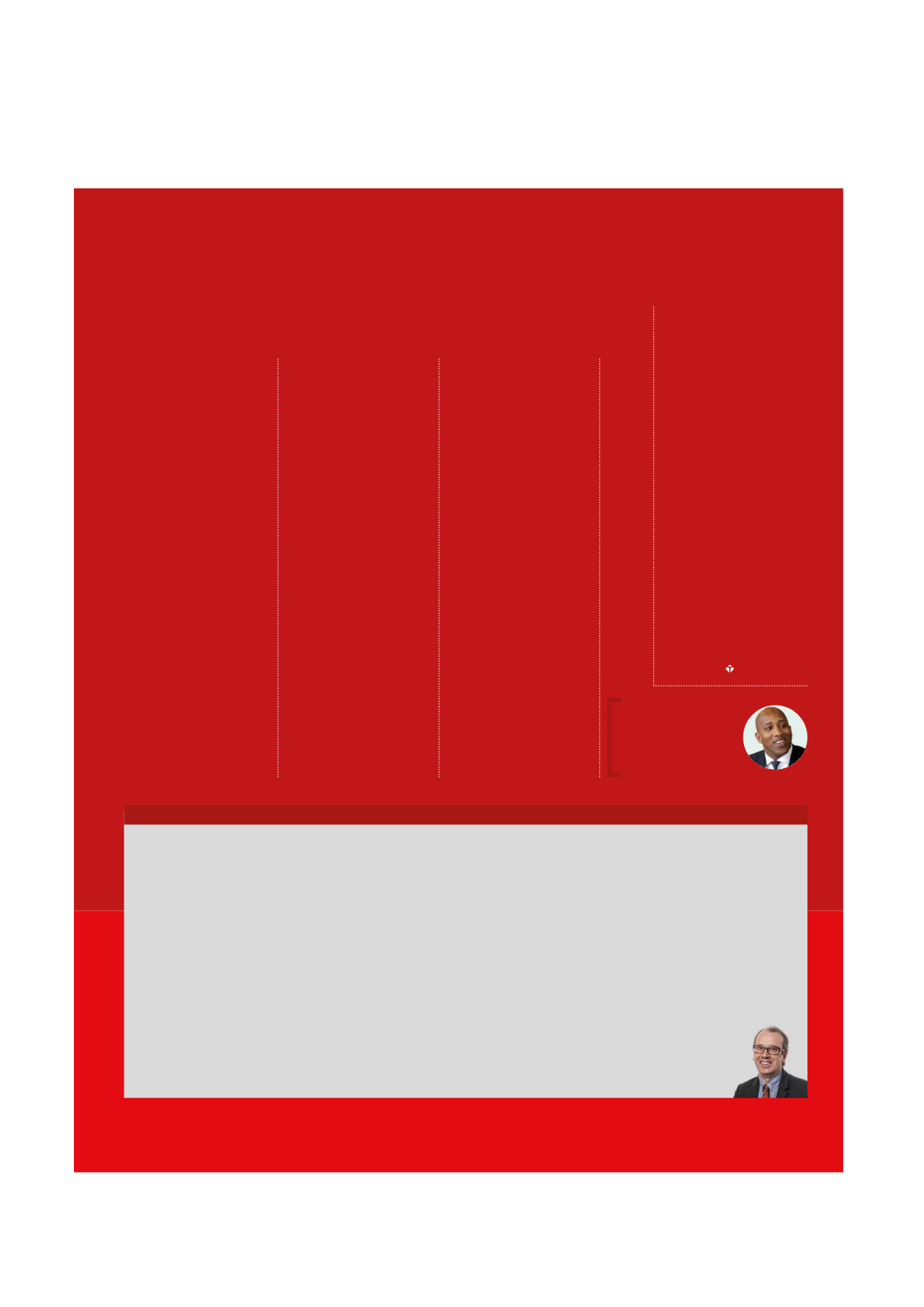

Press, Journal Article
STAYING RELEVANT – A CORPORATE VIEW
www.treasurers.org/thetreasurerMarch 2016
The Treasurer
39
inclusion and enable
mobile money, branchless
banking and unimaginable
innovation. These agile new
providers are looding into
the market to respond to
an as-yet unmet demand.
Nonetheless, it is still the case
that two billion consumers
worldwide currently do
not have a bank account.
Instead, they use on average
�� diferent inancial services,
and a staggering 91% save
via informal systems. Are
the corporate banks ready
to serve these new, divergent
breeds of inancial customer?
As banks continue to
retrench from regions or
sectors where they are unable
to meet speciic demand and
revaluate their operational
strategies, they will need
to be able to rely on their
personnel more and more
to deliver evolving products
and services.
and ‘growing the bank’ and its
products and services.
Corporate banks are ready
for increased debt-market
pressure throughout 2016.
It is therefore critical that
the hiring strategies of UK
corporate banks remain
robust to mitigate against
increased stresses that this
environment will bring.
Corporate clients and
banks are also inding that
they can no longer wholly
depend on long-standing
institutional relationships.
The UK government’s
current focus on inancial
inclusion for all represents an
additional set of competitive
pressures; especially targeting
lower-income citizens.
Financial inclusion not only
helps individuals and their
families, but it can also be a
powerful driver of economic
growth. The banking changes
we are seeing year-on-year,
particularly around digital
access and mobile banking,
have the potential to usher
in a new era of inancial
banking franchises in
London. The 2015 study
shows that there is a direct
correlation between a bank’s
products and services, and
how it compensates its
coverage bankers. The study
also shows that managing
directors of the top ive banks
are being ofered, on average,
a 38% increase on salary
packages to join a challenger
bank. That’s a hugely more
competitive landscape on
talent acquisition, and we
predict that the war on talent
in 2016 is only set to intensify.
The rise in executive pay is
set against a starker backdrop
of banks’ compliance
demands. Banks are not
only having to pursue robust
systems and processes to
grow proitability, but also
to demonstrate greater
accountability as a result
of tighter compliance
regulation. Too much
attention has been placed
on ‘running the bank’ and
maintaining the status quo
rather than on innovation
Michael Barrington-Hibbert
is CEO of Barrington
Hibbert Associates and
oversees the firm’s financial
services practice
Corporate banks are ready for increased
debt-market pressure throughout 2016
multiple suppliers, just as we
do as consumers.
In addition to new
products and services, banks
also need a new style of
leadership to drive new and
evolving business models,
identifying new markets and
delivering new services: the
ideal candidates are hybrid
bankers, who possess not
only leadership qualities,
but a high level of experience
in risk management and a
broad understanding of the
multitude of credit products,
derivatives and enhancements
that sophisticated corporate
clients want and expect.
Importantly, candidates must
also be willing to embrace
change. This type of talent
comes at a premium, which
is evident in the aggressive
recruitment strategies we’ve
seen in 2015 and highlighted
in our
Corporate Banking
Review Study for 2015
.
Each year, we interview
more than 400 corporate
bankers who work for the
top �� ranked UK corporate
It is clear that the digital revolution
has caused signiicant disruption
in the retail banking space,
particularly consumer payments
and lending. A plethora of
new entrants have seized the
opportunity to transform the
customer experience. Challenger
banks will hope to evolve to the
corporate space; however, they
are unlikely to be of signiicant
relevance. Hefty capital
requirements will also hamper
their ability to efectively compete
with traditional lenders.
The real threat to banks comes
from the non-bank players. In the
payments space, Amazon, Apple,
Google, Microsoft, et al, bring
serious and sustained competition
with a loyal and digital-savvy
customer base.
The banks have always invested in
technology; however, the regulatory
burden and the cost of maintaining
legacy systems results in an inability
to match the pace of change of the
more nimble intech companies.
They have to change and be able
to continually innovate or risk
becoming marginalised to simply
providing the pipes for others to
use, resulting in falling proits and
a real lack of opportunities to
generate additional revenue.
The banks need a digital strategy
to remain relevant – and how
efectively they utilise new
technology either via acquiring
or partnering with intech will
determine who remains standing
as we see further consolidation
in the banking sector. British
American Tobacco already
partners with intech companies
to support treasury operations
and e-commerce while currently
assessing providers in the trade
inance space. Over the coming
years, we hope to see the banks
make the necessary investment
to support the domestic payment
modernisation currently under way
across the world. While we want
real-time payments, they can’t
just be fast, they have to address
concerns around reliability, risk,
security, compliance and enhanced
automation. We also expect
signiicant improvements in
cross-border payments, with
intech again leading the way.
Distributed ledger technology is
a game changer and it is reassuring
to see the banks now starting to
make the necessary investment
and reassessing their approach
to payments. Those that can
commercialise their strategy
and invest in digital infrastructure
will be the clear winners in the
long term.
Neil Wadey is group
treasurer at British
American Tobacco
48
















